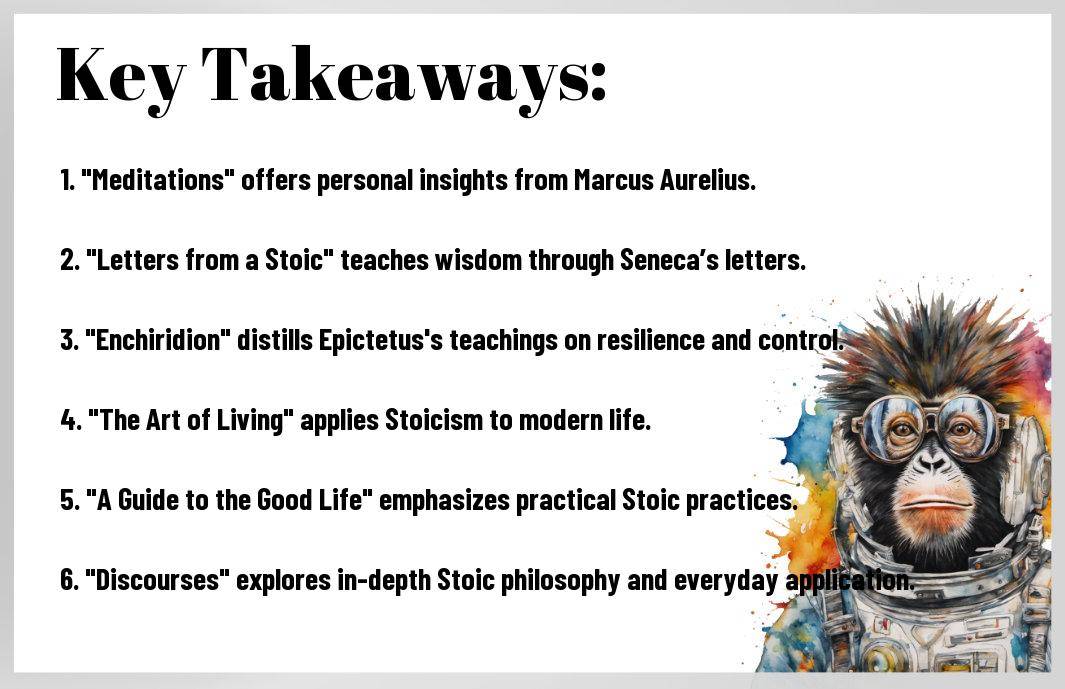
Newsletter Subscribe
Enter your email address below and subscribe to our newsletter

Enter your email address below and subscribe to our newsletter

Books have always been my go-to source for knowledge and personal growth, and Stoic philosophy offers timeless wisdom for anyone looking to improve their life. I believe that the teachings of ancient Stoics can help you navigate challenges, cultivate resilience, and find peace in the present moment. In this post, I’ll share some of the must-read Stoic books that have profoundly influenced my journey toward self-improvement, and I’m excited to help you discover these gems!


As I explore the world of Stoic philosophy, I find that the classics offer a rich reservoir of wisdom and insight that has endured the test of time. These foundational texts not only lay the groundwork for Stoic thought but also resonate deeply with anyone on a self-improvement journey. From the reflections of a Roman emperor to the correspondence of a wise statesman, these writings encourage us to live meaningfully in the present while maintaining perspective on life’s challenges.
Aurelius, a stoic philosopher and Roman emperor, crafted his work “Meditations” as a series of personal reflections meant for his own guidance. Written in a candid and contemplative tone, he shares the lessons he learned throughout his life, emphasizing the importance of self-discipline, rational thought, and virtue. His bite-sized wisdom encourages you to cultivate inner strength and remain centered, no matter the turbulence that life may throw your way. What I particularly appreciate about this text is Aurelius’s ability to make philosophy accessible and relatable, reminding me that self-improvement is an ongoing journey.
Between the lines of “Letters from a Stoic”, Seneca offers profound insights on how to navigate life’s emotional landscapes. These letters, addressed to his friend Lucilius, cover a wide range of topics, including the nature of happiness, the inevitability of death, and the importance of virtue. Seneca’s approachable style allows you to engage with Stoic philosophy in a conversational manner, making it feel like a personal dialogue rather than a distant academic study.
And what makes “Letters from a Stoic” particularly engaging is Seneca’s real-life applications of Stoic principles. His reflections on adversity, loss, and the fleeting nature of time help me find clarity and strength in my own life. By sharing his personal thoughts and experiences, Seneca creates a sense of intimacy, inviting me to explore my own emotions while encouraging me to cultivate resilience and a more mindful approach to daily living. It’s a must-read for anyone seeking guidance through robust yet relatable Stoic wisdom.
Now, modern interpretations of Stoicism have made this ancient philosophy more accessible and relevant to our daily lives. Authors like Ryan Holiday have taken Stoic principles and integrated them into practical advice for the challenges we face today. Their work serves as a bridge between classical wisdom and contemporary self-improvement, allowing us to draw from Stoicism’s rich heritage while applying it to our personal journeys of growth and resilience.
Along my journey to understand Stoicism, I found “The Obstacle Is The Way” by Ryan Holiday to be particularly impactful. In this book, Holiday discusses the idea that obstacles are not just hindrances but can actually serve as pathways to growth if we change our perspective. He gathers inspiring historical examples of individuals who faced great challenges and turned them into opportunities, teaching me that my struggles can be my greatest teachers.
Across the pages of “The Daily Stoic,” Ryan Holiday and Stephen Hanselman offer insights for living a more Stoic life each day. This book provides daily readings that pair philosophical reflections with practical exercises and actions I can implement right away. I love how the concise format allows me to engage with Stoicism on a regular basis without feeling overwhelmed. Each passage seems to speak right to my current situation, reminding me to stay grounded and practice mindfulness amidst life’s chaos.
Understanding Stoicism through “The Daily Stoic” not only deepens my appreciation for this philosophy but also makes it an integral part of my daily routine. The consistent reflections help reinforce the idea of focusing on what is within my control, while the exercises serve to remind me to align my actions with my values each day. I often find that taking a few moments each morning to read and reflect sets a positive tone for the day ahead, allowing me to approach challenges with a sense of calm and purpose.
Your journey into Stoic philosophy can be immensely enriched by practical guides that not only enlighten but also offer actionable advice. Two prominent books in this realm are “How to Be a Stoic” by Massimo Pigliucci and “A Guide to the Good Life” by William B. Irvine. These texts probe into the heart of Stoic principles and demonstrate how they can be woven into our everyday lives, helping you live with more purpose and resilience.
Along this journey, I found Massimo Pigliucci’s “How to Be a Stoic” to be an invaluable resource. The book serves as a heartfelt exploration of Stoic philosophy, blending ancient wisdom with modern-day perspectives. Pigliucci doesn’t just explain Stoicism in theory; he shares personal anecdotes and practical exercises, which truly help you internalize the principles. I appreciated how he encourages us to engage with Stoicism as a way of life, making it relatable and applicable to our day-to-day challenges.
By embracing Stoicism through William B. Irvine’s “A Guide to the Good Life,” I felt empowered to reshape my understanding of what constitutes a fulfilling life. Irvine emphasizes the importance of practical techniques, such as negative visualization and identifying what is within our control. These methods are not just theoretical concepts; they have the potential to transform your perspective when faced with life’s inevitable ups and downs.
Life can often feel overwhelming, but Irvine’s book presents Stoicism as a pathway to tranquility and satisfaction. The way he discusses applying Stoic principles makes it feel achievable and realistic, helping me foster resilience and a deeper sense of appreciation for the present. If you’re looking to enhance your self-improvement journey, this guide is not to be overlooked; it’s packed with wisdom that is easy to understand and implement. Trust me, there’s no better feeling than cultivating a good life grounded in Stoic teachings.

Not many philosophies offer tools as practical as Stoicism, especially when facing the myriad of daily challenges life throws our way. When grappling with stress, anxiety, or difficult emotions, the teachings of Stoic philosophers can provide guidance that transforms our perspective. By incorporating their timeless wisdom, I’ve found it easier to navigate life’s ups and downs, helping me maintain a calm and resilient mindset no matter the situation.
Across various situations, “The Art of Living” by Epictetus serves as a beacon of Stoic principles. This book distills the philosophy into practical advice, focusing on how to live a fulfilling life despite external circumstances. I truly appreciate how Epictetus emphasizes the importance of separating what is within our control from what is not, which allows me to focus my energy on actions that foster my well-being and inner peace.
Discourses are necessaryly a series of teachings that examine deeper into Stoic thought, revealing how to apply principles in real-world situations. I find that Epictetus’ approach in this collection resonates deeply with my daily life challenges. The dialogues are filled with relatable examples, making it easier to internalize Stoic lessons and find ways to practice them in my interactions and decisions.
Stoic teachings in “Discourses” reflect on the importance of self-discipline, virtue, and living in harmony with nature. Epictetus brings forth a variety of topics—from handling adversity to managing our desires—that I find incredibly relevant today. This book not only encourages me to reflect on my thoughts but also inspires me to embrace every challenge with a mindset grounded in Stoic resilience. The insights provided have truly shaped my perspective toward a more balanced and thoughtful way of living.
Unlike many philosophies that remain abstract and focused solely on theory, Stoicism is rich with narratives about inspiring figures whose lives exemplify its principles. Reading about the lives of these Stoics gives me a more personal connection to their teachings, letting me see how they applied their beliefs in real situations. It’s fascinating to discover that their struggles were not unlike my own, which makes their wisdom resonate on a deeper level. When I probe into these biographies, I find myself motivated to incorporate their lessons into my daily life.
Around the world of philosophy, Peter Adamson’s “The Stoics” stands out as a vivid exploration of influential Stoic thinkers. Adamson dives deep into the lives and thoughts of figures such as Seneca, Epictetus, and Marcus Aurelius, providing rich context and engaging anecdotes. I find his style to be both accessible and enlightening, which makes it easier for me to grasp the essence of Stoic philosophy through the experiences of these remarkable individuals. Each chapter feels like a conversation, pulling me into their world and allowing me to reflect on their struggles, aspirations, and ultimately, their resilience.
Stephen Holiday and Hanselman have crafted a compelling narrative in “Lives of the Stoics,” which captures the colorful lives of the Stoics in a way that’s both informative and entertaining. They highlight not just the philosophies but also the personal challenges these individuals faced, making it relatable for you and me. Through their engaging storytelling, I feel like I’m on a journey with these Stoics, exploring the triumphs and tribulations that shaped their teachings. It’s a reminder that the path to wisdom is often paved with hardship and that we can learn a lot from their resilience.
To dig deeper, “Lives of the Stoics” explores each Stoic figure’s life in a succinct yet impactful manner, tying their philosophies to poignant real-life moments. It encourages me to reflect on my personal experiences while finding parallels in the Stoic teachings, allowing for growth and development. Each story serves not only as a lesson in philosophy but also as an invitation to cultivate my own self-improvement journey through the lens of Stoicism.
Many people wonder how to effectively weave Stoic principles into their everyday routines. The beauty of Stoicism is that it provides practical strategies that help you remain composed and focused, especially during challenging times. Incorporating these practices into your life can lead to a profound sense of inner peace and clarity, making it easier for you to navigate the ups and downs of existence. With a little dedication, you can transform your mindset and outlook on life.
Practices such as journaling, meditation, and reflection can greatly enhance your Stoic mindset. Each morning, I find it beneficial to take a few moments to contemplate the day ahead. I visualize challenges that may arise and remind myself that my responses are within my control. This sets a positive tone and helps me approach situations with a sense of calm and resilience. In the evenings, I often reflect on my actions and thoughts throughout the day, assessing where I stayed true to Stoic principles and where I could improve.
Above all, a well-curated reading list can immerse you in Stoicism and enrich your understanding of its principles. I encourage you to include classic texts by philosophers like Seneca, Epictetus, and Marcus Aurelius, as well as modern interpretations that can connect historical lessons to contemporary life. These works not only offer insight but also practical wisdom that can be applied to your daily experiences, helping you grow and adapt with a Stoic mindset.
List the books that spark your interest and set aside time each week to probe them. Whether it’s a few pages or a whole chapter, engaging with these texts regularly will deepen your connection to Stoic thoughts. You might even consider joining a book club or community that shares your enthusiasm for personal growth through Stoicism—this way, you can exchange ideas and insights while enriching your reading experience.
Summing up, exploring must-read Stoic books for self-improvement has been a rewarding journey for me, and I truly believe it can be for you as well. These texts not only provide practical strategies for dealing with life’s challenges but also offer profound insights into how to cultivate a resilient mindset. By integrating the teachings of Stoicism into my daily life, I have found greater peace and clarity, and I’m excited for you to experience those benefits too. Whether you’re a seasoned reader or just starting on this path, there’s something in these books that can resonate with your journey.
If you’re keen to explore deeper into Stoicism, I encourage you to check out this Stoicism Reading List – The Best 6 Books to Read. It’s a fantastic resource filled with selections that can further guide your self-improvement efforts. So grab a book, settle in, and let the wisdom of Stoic philosophy inspire you to become your best self. Happy reading!
A: Some highly recommended Stoic books include “Meditations” by Marcus Aurelius, “Letters from a Stoic” by Seneca, “The Enchiridion” by Epictetus, “A Guide to the Good Life” by William B. Irvine, “The Obstacle Is the Way” by Ryan Holiday, “The Daily Stoic” by Ryan Holiday and Stephen Hanselman, and “How to Be a Stoic” by Massimo Pigliucci. Each of these offers unique insights into Stoic philosophy and practical applications for modern life.
A: Stoic books provide philosophical foundations that promote resilience, self-discipline, and emotional control. They offer practical tools for dealing with adversity, making better decisions, and cultivating virtues like courage and wisdom. By engaging with these texts, readers can develop a mindset that emphasizes personal responsibility and inner peace, contributing to overall self-improvement.
A: Yes, some excellent beginner-friendly Stoic books include “The Daily Stoic” by Ryan Holiday, which presents daily readings with practical reflections, and “A Guide to the Good Life” by William B. Irvine, which introduces Stoic principles in accessible language. Both books make Stoicism relatable and applicable for modern readers starting their journey.
A: Major themes in Stoic literature include the importance of virtue, the nature of control, the value of rational thought, and acceptance of fate. Stoics emphasize focusing on what can be controlled while accepting what cannot. Additionally, concepts like gratitude, mindfulness, and the impermanence of life are prevalent, all contributing to a robust framework for self-improvement.
A: While one book can offer valuable insight into Stoic philosophy, reading multiple texts can provide a more comprehensive understanding and different perspectives. Each author presents unique interpretations and applications of Stoicism, enriching the reader’s grasp of the philosophy and its applicability to various aspects of life.
A: To incorporate Stoic principles into daily life, start by practicing gratitude and reflection. Keep a journal to note your thoughts and experiences, applying Stoic maxims to your challenges. Additionally, utilize techniques like negative visualization to prepare for setbacks and mindfulness exercises to stay present. Regularly revisiting the key teachings from these books can also reinforce their application in your everyday life.
A: Absolutely, the lessons from Stoic books are particularly beneficial during challenging times. Stoic philosophy focuses on resilience, acceptance, and maintaining calm in the face of adversity. By emphasizing the importance of mindset and perspective, these teachings can provide clarity and strength when navigating difficulties, helping individuals to focus on actionable responses rather than being overwhelmed by circumstances.